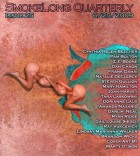Tell us about “after Jordan Sanderson.”
I met Jordan in grad school. He’s not (yet) a widely known poet but he’s brilliant and has had a huge influence on me. He was sort of instrumental in introducing me to surrealism, to a lot of -isms actually. For my money, he’s one of the best prose poets writing today. I rate him right up there with Tate, Simic, Edson. Although I consciously composed this piece as flash fiction, I tried to use Jordan’s poetry (its imagery, its tone, its sensibility) as a sort of jumping off point. Thus, the “after.”
Where did this story come from? What was the starting point, or image, or idea?
I guess I sort of answered this with the last question, at least in terms of the story’s context. The real story, the meat of the thing, if I had to pin it down, was that I wanted to use a surreal situation to explore the absurdity of loss, of losing someone. I haven’t written much fiction (always more of a poet) but it seems that my (few) successful stories tend to start with a voice—a specific first-person. Once the voice starts I kind of just follow along and try not to break the spell. Here “the voice” spoke in short sentences and used an epistolary kind of style which gave the piece the feel of a catalog, an inventory. The speaker is, in a matter of fact way, breaking down what’s happening—what’s happened. She’s using logic as a means of controlling otherwise incomprehensible events: the raining keys, the disappearance of “you.” There’s never any overt emotion or outburst, but in the last stanza, when the speaker turns inward, the language becomes a little more qualitative and the repetition a little more obvious which is where you see her starting to unravel, to lose her grip a bit.
Keys often symbolize an answer to a question, or a solution to a problem. Here it seems that there are infinite solutions to an unnamed problem. Is this so? If so, what, as the author, did you see as the “problem”?
A key is, of course, heavily symbolic and it was important to me not to exploit the image by calling attention to that symbolism—which is to say, the keys are first and foremost actual keys. I liked the way they looked in my head—little, shiny, gold. Small objects and images seem to come across on the page in a more powerful, more vivid way than large or complex ones; a fork, for me, is easier to picture than a forklift. That being said, I like your reading of them as “infinite solutions to an unnamed problem.” On the one hand the keys themselves are a problem—in the same way a plague of locusts is a problem—and they work as a kind of catalyst. They initiate a frenzy of activity but in a larger sense they neither cause nor solve the speaker’s problem. The problem as I see it (for what that’s worth) is the loss of the speaker’s “you” and more specifically the speaker dealing with the absurd truth that the world doesn’t stop when you lose someone—the sun keeps rising, the keys keep falling, etc.
I see you write poetry and fiction. Andersonville feels, to me, like a story with a lot of poetry in it. Are these two types of writing vastly different for you, or do they come from the same place? Do you often find they intermingle this way?
Poetry is my first love but in the past few years I’ve gotten into a lot of different genres: fiction, non-fiction, drama, I even tried my hand at longer fiction with an absolutely awful 3-day novel I had a blast writing last Labor Day weekend. I’ve actually given a lot of thought to this question of intermingling and to what extent my poetry plays into my prose and vice versa, but every time I think I’ve figured out some distinction between the two another exception comes to mind. For example, I think of flash fiction as needing a certain amount of exuberance, or suspicion, or as Steve Barthelme says, “death lurking somewhere nearby;” but then I think these are also elements I use (often) in my poems—so I’m back to square one. What I know for sure is that my focus, no matter what I’m writing, is always on the words, the phrasing, the music of the thing. So I guess my answer is no, these two types of writing aren’t vastly different for me. And while each genre obviously presents its own challenges, there’s certainly a great deal of overlap—different pots, different burners, but in the end it’s all cooking on the same stove.



 The core workshop of SmokeLong Fitness is all in writing, so you can take part from anywhere at anytime. We are excited about creating a supportive, consistent and structured environment for flash writers to work on their craft in a community. We are thrilled and proud to say that our workshop participants have won, placed, or been listed in every major flash competition. Community works.
The core workshop of SmokeLong Fitness is all in writing, so you can take part from anywhere at anytime. We are excited about creating a supportive, consistent and structured environment for flash writers to work on their craft in a community. We are thrilled and proud to say that our workshop participants have won, placed, or been listed in every major flash competition. Community works.